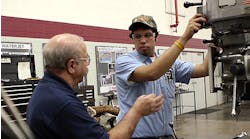Although nearly all the ‘content’ of my work is concerned with metalcasting and related manufacturing issues, my colleagues and I are in the media business, and so the problems we manage have to do mainly with “time” and “space”: our target audience has less time to consume the content we produce, and so we have fewer opportunities to locate and engage them on subjects we think are important. And, because the audience is not waiting for us at their mailboxes (as long ago we supposed), we have to occupy more and different spaces in order to contact them. Thus, we are present now in what’s referred to as cyber-space, or more specifically ‘the online space,’ the ‘social space’, and the ‘direct marketing’ space’, just to list some of the alternative realities where we operate.
Now, I am viscerally opposed to stretching and altering language in such ways as this, because I think it alters the sense of common understanding by which we live and communicate. But, all this changing reality is something that we media types have in common with our manufacturing readers: they’re trying to overcome the challenges of time and space in their businesses, too. Metalcasters struggling to complete work on shorter delivery schedules are trying to overcome time. Foundries working to capture airborne particles are fighting restrictions imposed by space (among other factors.) Plants trying to catch up to production quotas are struggling against time (unscheduled down-time, to be specific.) Manufacturers of all types that need to add new or expand current capabilities must bear a cost burden in order to manage the time needed to make that change, and pay to create or acquire the space that will help to accomplish it.
This is in fact a very constant reality, for time and space have been the burdens of humanity since the dawn of history and for each of us from the very instant that we are born. All of the great progress in human civilization has been marked by the ability to control and improve the spaces surrounding us; or to move out of confinement into new and better spaces; or to enhance and prolong the time available to us during while we live.
It is not just the limits of time and space that frustrate us here in the present, but the changes in time and space that we perceive and do not like — in business, politics, government, commerce, entertainment, and of course, media. How many times in a day do you suppose you hear or utter, “Whatever happened to …” or “Things are changing too fast …”?
You and I are not wrong to be at odds with this changing reality, but there is reassurance in knowing how permanent and pervasive the problem is. Time and space should not threaten or deter us from our goals, but we must not set our hopes only (or first) on temporal or tangible things. There’s more to life than that.









